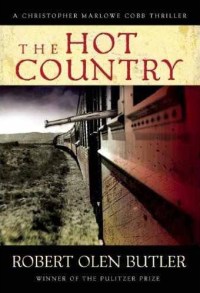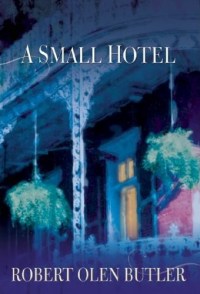Late City by Robert Olen Butler
 Monday, September 6, 2021 at 6:13AM
Monday, September 6, 2021 at 6:13AM 
Published by Atlantic Monthly Press on September 7, 2021
Robert Olen Butler’s new novel explores the harm caused by a parental or social insistence that “real men” must behave in a way that allows the world to witness and appreciate their manliness. More broadly, Butler suggests that harm is done whenever people of either gender are made to deny their true selves.
While the novel’s title may have more than one meaning, the obvious reference is to the late city edition of a newspaper — the edition that comes at the end of the news day, the one that reports all the day’s events, when it’s too late to add anything new. After 115 years, Samuel Cunningham is at the end of his life, looking back at key events as if they were a series of news stories, the late city edition that recounts all of the news of a life that’s worth reporting.
Sam recounts those stories from a nursing home bed, where he resides as the last living veteran of the First World War. He reviews significant episodes in his life because it is finally time to die. A gender-fluid God (“don’t concern yourself with pronouns,” God tells Sam) is in the room as Sam approaches death, forcing him to give an accounting of his life, to voice his regrets and admit his mistakes, to gain an understanding of his relationships with his parents, wife, and son before God determines Sam’s eternal fate. Since the story is told from Sam’s perspective, whether or not God is actually present or the manifestation of a dying delusion isn’t important. Real or imagined, God is a device that prompts Sam’s self-critical evaluation of his life.
On its surface, Sam has lived a fine life. He grew up in Louisiana, where his father taught him to hunt with a rifle. Seeing his father abuse his mother but being too afraid to intervene, Sam lies about his age and joins the Army as World War I begins, sneaking off in the night, saying goodbye only to his mother, protecting her with a postcard to make his father believe that she had no advance knowledge of his plan.
Using the hunting skills he learned from his father, Sam becomes a sniper. He kills more than a hundred men, envisioning one of them as his father, a vision that doesn’t stop him from pulling the trigger. Sam learns that war is about “millions of men being forced to become somebody who has to dig a hole in the ground and then go down in it or jump up out of it and die a ferocious, savaging death when you just want to be a farmer or a teacher or a sale clerk or a guy stoking coal in a tramp steamer.” People not being allowed to be who they want to be, and how that denial of self-determination harms society as much as the individual, is one of the novel’s key themes.
Sam befriends a man who gives comfort to wounded soldiers in the trenches, hugging them and even kissing them when they believe they are being held by their mothers. When it comes time for Sam to do the same for his friend, Sam needs to ask himself whether he is capable of that kind of intimacy.
At the war’s end, Sam moves to Chicago, a destination far from Loouisiana. He has long loved newspapers and has a talent for writing, his only talent apart from killing. He finds a room in the home of a war widow, earns a job as a cub reporter at a progressive newspaper by writing a sensitive piece about the city’s race riots, marries and has a son. In another key scene, when his son is eleven, Sam explains that being a man means having the courage to kill other men to protect a country. That discussion, a few years later, motivates Sam’s son to join the Navy just before the US enters World War II.
From the end of the war until Sam’s visit from God, shortly after Trump’s election, Sam lives with the consequences of how he shaped his son’s life. It is only at the end of Late City that Sam comes to understand the truth about his son, to understand the harm to which he has contributed by failing to love him unconditionally and with his whole heart. He has a similar revelation about his wife, about how his and society’s expectations shaped the woman she became.
Late City isn’t a story about toxic masculinity. Sam is a decent but misguided man, a product of his time who, by rejecting racism, is a better man than many of his peers. He doesn’t want to hurt anyone. He truly loves his wife, even if he gives more attention to his career than to her. He wants to observe the world and report it rather than being part of it. But Sam could have been more than decent. He could have been a helper, not just an observer. He could have been more open and accepting.
After Sam learns those lessons by considering his life in retrospect, the novel’s final pages give Sam a small opportunity for redemption. That's a sweet and touching moment.
The story concentrates on Sam’s life from the First to the Second World War. The years that follow feel rushed, although they do bring Sam’s wife and marriage into sharper focus.
I caught myself holding my breath during a few tense moments in Late City. At other points, I was genuinely moved by the story. I disagree with the New York Times reviewer who called the novel outrageously sentimental. It isn’t a literary sin for authors to make readers feel something. Obvious emotional manipulation for its own sake is a drag, but the emotional response that Butler induces comes from a place of honesty. I did not feel manipulated by forced sentiment. Rather, I empathized with Sam’s belated realizations that, at three or four times in his life, he was less of a man than he should have been, no matter how many enemy soldiers he managed to kill.
The novel’s honesty extends beyond Sam’s examination of his own life and becomes a commentary on a society that forces good people to lose their own identities by conforming to standards imposed by others. Perhaps readers who cling to antiquated standards will deny the truth or the beauty of Late City. Readers with open minds might appreciate this heartfelt story of the mistakes a decent man can make during a long life.
RECOMMENDED



